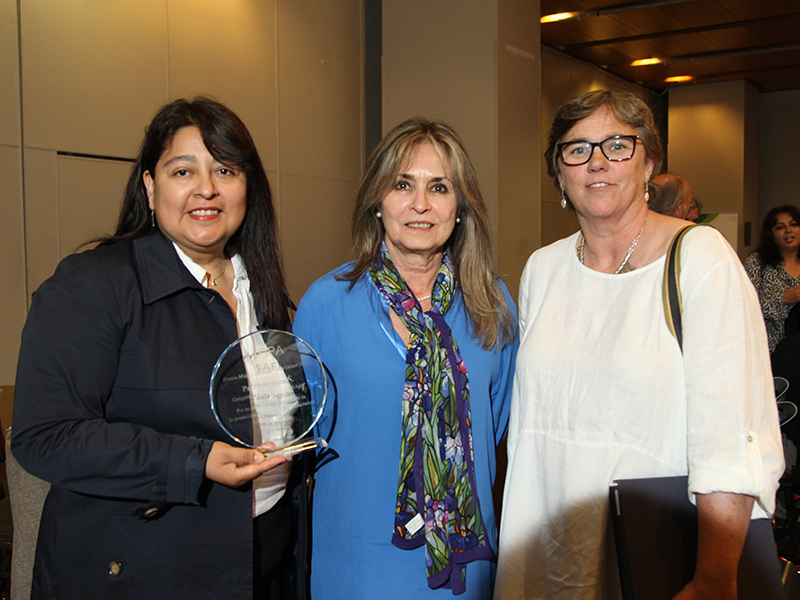February 2024
With the third edition of the “Woman of Agriculture Mónica Gebert” award, the National Association of Manufacturers and Importers of Agricultural Phytosanitary Products, AFIPA CHILE, highlights the transformative work of women in Chilean agriculture
By: Patricia Villarreal C.
Executive director
AFIPA CHILE
This initiative demonstrates the commitment of the crop protection industry to compliance with the UN Social Development Goals (SDGs), particularly the one on gender equality, the purpose of which is to empower women, a fundamental aspect to boost economic growth and promote social development.
In Chile, according to the National Institute of Statistics (INE), agricultural activities employ 5% of the country's total workers. Of this percentage, 24% are positions held by women and many of these jobs are informal. Figures that show the need to recognize the role played by women in different functions in agriculture. Reason why we decided to create this recognition that gives the opportunity to professionals and workers in the sector to participate, showing their contribution with actions and initiatives in favor of sustainability and the promotion of Good Agricultural Practices.
The name of the award is a tribute to Mónica Gebert, a teacher, researcher, businesswoman and reference for agriculture in Chile for her contributions to research on diversity, productivity and profitability in grain production. Gebert was a teaching and research analyst chemist in the Department of Bromatology at the University of Concepción and the School of Agronomy at the Chillán location. She was associated to research and development institutes such as INIA, ODEPA and several educational centers.
In the three editions of the award, the jury has been made up of representatives of the public and private sectors. To select the winners, they have prioritized creativity and the impact on sustainability of the applicants' initiatives and actions. Below are the 3 winners of the 2023 version of the award:
Paula Aguilera Ñonquepan, is an agronomist, originally from Temuco in the Araucanía Region, PHD and academic at La Frontera University, she is the founder of Myconativa, a company that created and developed the product Yegun Nativa, five species of mycorrhizal fungi that are today used throughout the country with excellent results in the production, yield, quality and profitability of vegetables, fruit trees and extensive crops.
Liliana Camelio Contreras is an agronomist from the University of Valparaíso, founder of the company Biofuturo Ltda, dedicated to promoting the sustainable development of fruit orchards throughout the country, through the integration of biological pest control with controllers that are developed in a biofactory located in the Araucanía Region. Throughout her working life, she has permanently contributed to the development of small-scale fruit producers in the southern regions of Chile through collective projects that allow them, in the short and medium term, to increase the sustainability of their crops.
Marcela Esterio Grez, an agronomist, professor and lecturer at the University of Chile, has contributed with her countless research works to the agricultural sector. Her studies and research have focused mainly on improving the quality of Chile's export products, becoming a contribution to the success of the country's fruit industry. Her teaching work has allowed the development of professional skills of several generations of outstanding agronomists who contribute with their knowledge to the agricultural sector to improve the yield and quality of crops, and which has earned her leadership not only at the national level but also internationally.

These women, like Mónica Gebert, leader of the agricultural world in southern Chile, are an example of the role that women have in the development of agriculture. Their experiences and trajectories, from the scientific field to the impact on their communities, make them fundamental pillars for the growth of the agricultural industry and the production of quality and safe food for Chile and the world.
It has been proven that women are a factor of change in all productive sectors and that historically they have had greater awareness and commitment to sustainability. In this sense, the role that women have today is indispensable in agriculture, both as entrepreneurs in peasant family farming, and in the development of human and scientific capabilities in academia; which leads us as a trade union to a new challenge: to highlight their participation in all links of the agri-food value chain. As AFIPA Chile, we are convinced of the need to recognize and enhance their presence in each area, not only with the purpose of promoting gender equality, but also as a necessary contribution to the resilience and sustainability of the agricultural sector, essential values to face the challenges posed by climate change and national food security, also paving the way for a more equitable and prosperous future
Find out about the winners of previous editions here
































